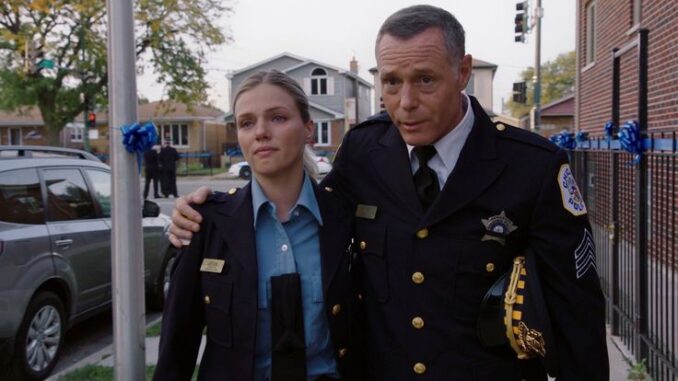
In the world of Chicago P.D., loyalty has always been a loaded weapon. For years, the Intelligence Unit operated with a code that bent rules, dodged oversight, and followed one man’s gut: Hank Voight. But as times changed, so did the team. And no moment captured that shift more powerfully than when Hailey Upton said “no” to Voight. It wasn’t just a refusal—it was a revolution. A moment when one of Voight’s most trusted soldiers stopped following orders and started listening to her own conscience.
Upton’s evolution has always been layered. When she first joined the Intelligence Unit, she was tough, observant, and eager to prove herself. Voight saw potential in her—not just as an officer, but as someone who could understand the dark compromises that his leadership often required. Over the seasons, Upton didn’t just learn from Voight—she began to mirror him. She made hard choices, covered up questionable actions, and justified bending the law if it meant saving lives. But beneath that steel exterior was always something Voight underestimated: a moral compass that never fully broke.
Everything came to a head when Voight made one of his most questionable decisions—one that blurred legality, justice, and vengeance. Upton was there. And this time, instead of following the plan, she hesitated. She questioned. And ultimately, she refused.
That decision wasn’t just about the moment—it was about everything that had built up inside her over years of compromise. The guilt. The trauma. The sleepless nights. And, perhaps most significantly, the realization that being Voight’s protégé had changed her in ways she wasn’t proud of.
For Voight, this refusal was more than disobedience—it was betrayal. Here was a woman he had mentored, trusted, even shielded from Internal Affairs. Someone he thought would carry the torch long after he was gone. And now, she was standing against him. The pain in his eyes wasn’t just anger—it was confusion. Shock. Maybe even a trace of fear.
Because if Upton could turn on him, who else might?
The aftermath of their confrontation reverberated through every scene that followed. The dynamic between them, once grounded in unspoken trust, became charged with silence and suspicion. Every time they shared a screen, viewers could feel the tension. Upton didn’t back down. Voight didn’t apologize. And neither of them was willing to say out loud what everyone already knew: the Intelligence Unit was changing—and Voight was no longer in complete control.
This storyline was a masterclass in character development. On one side, you had Voight: the old guard, the warrior hardened by personal tragedy and institutional corruption. On the other, Upton: the new voice, shaped by trauma but unwilling to lose her identity in the name of justice. Their clash wasn’t just personal—it was generational. It was about how policing must evolve, how leadership must adapt, and how loyalty must be earned—not demanded.
Fans were divided. Some stood firmly with Voight, arguing that his way, while messy, gets results. Others praised Upton for finally challenging the unchecked power structure within the unit. But one thing was clear: this moment changed the trajectory of Chicago P.D.
Hailey Upton’s courage didn’t come with loud speeches or moral grandstanding. It came in quiet decisions. In walking away from a cover-up. In refusing to lie. In saying “enough” even when it meant risking her career—and possibly her life. That kind of bravery is rare on television, especially in police dramas where hierarchy often silences dissent.

And Tracy Spiridakos, who plays Upton, delivered every ounce of that complexity with precision. Her performance was subtle but seismic. Her eyes told stories her mouth never did. You could see the storm beneath the surface—the inner war between loyalty and truth, fear and righteousness. In a series filled with intense performances, Spiridakos stood out by showing restraint, by making pain feel personal and not performative.
As for Voight, Jason Beghe once again proved why he is the heart of Chicago P.D. His portrayal of Voight during this arc was heartbreaking. This wasn’t the raging Voight we’ve seen break bones and threaten criminals. This was a Voight who was losing control, not of the streets—but of his people. And in many ways, that hurt more.
One of the most poignant scenes comes when Voight sits alone in his office after Upton walks away. No dialogue. No movement. Just silence. It’s in that moment we see a man grappling with the cost of his leadership style. For years, he built his kingdom on loyalty, fear, and results. But now, as the world changes, he’s left asking a terrifying question: What if I’m no longer what this team needs?
The ripple effects were felt across the unit. Other members began to speak up more. The once-unquestioned command structure became less rigid. Cases were handled with more oversight. And the emotional toll of past actions—so often buried under bravado—started to surface. It was as if Upton’s stand had unlocked something in everyone else.
And that’s what makes this arc so vital to the evolution of Chicago P.D.. It wasn’t about rebellion. It was about responsibility. About reckoning. About redefining what it means to be part of a team when the team’s leader refuses to evolve.
Hailey Upton didn’t just challenge Voight. She challenged the viewers. She made us question our definitions of loyalty, justice, and power. And she reminded us that silence in the face of wrongdoing isn’t strength—it’s surrender.
In the end, Chicago P.D. didn’t give us a clean resolution. Voight and Upton didn’t hug it out. The tension didn’t magically disappear. And that’s exactly what makes this storyline so powerful—because in real life, moral courage rarely comes with a bow. It comes with sacrifice, loneliness, and the quiet conviction that doing the right thing is worth it.
